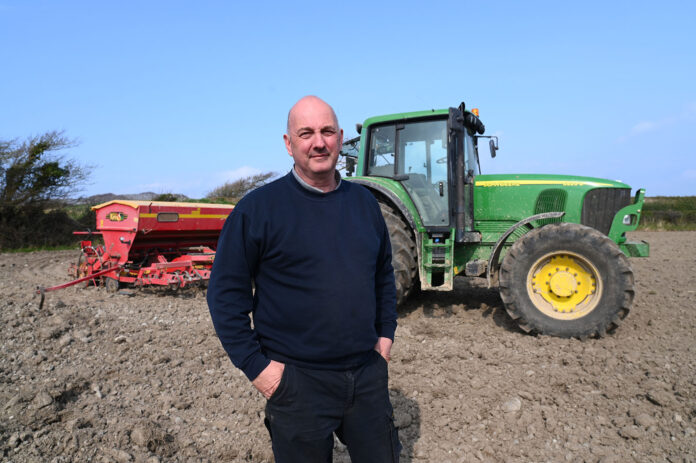A NORTH Clare tillage farmer and agricultural contractor has claimed a government initiative encouraging more tillage production in response to the Ukrainian war is “waste of
time” and a “hair brained scheme”.
Previously involved in electronics, Shane Nolan left his work in Dublin in the early nineties and took over his father’s farm in Finavara and started renting land for tillage.
The secretary of the Western Division of the Association of Farm & Forestry Contractors of Ireland (FCI) pointed out a dairy or beef farmer would have to reduce the amount of cattle on their land to try and grow a tillage crop.
“It would be like me milking cows. I might know what a cow looks like but I wouldn’t know how to maintain a cow. At least with tillage crops I know what I have to do. It is like asking a doctor to go and wire a house.”
He said non-tillage farmers have approached him seeking advice about growing a cereal crop.
“I asked them have your seed? No. Have you organised your fertiliser? No. Have you got a plough? No. Do you have any way of tilling your land? No. Have you got a sprayer? No. Have you got a combine harvester? No. What will you do with your seed when you cut it? I don’t know. Have you got a shed to tip it into? No. Have you priced how much the seed is going to be? No.
“The €400 grant a hectare will be taken up in fertiliser, cost of seed and sprays. The government are really doing nothing to help farmers sow barley because they will probably be worse off, having taken some of their land out of grass production. The government don’t know because they haven’t a clue.”
He recalled his father used to plough land in October, leaving the ground to be broken up by the frost, rain and wind. However, the ban on winter ploughing now means tillage farmers may
have to wait until March to do more tilling to make it suitable for sowing.
He pointed out fertiliser had soared even before Russia invaded Ukraine. The cost of 20 litres of roundup to burn off weeds before ploughing has jumped from €80 to €330 in 12 months. Agricultural diesel has jumped from 60 cent a litre to €1.37 over the last year.
Criticising lobbying by some environmentalists, he claimed the peat burning generating station in Rhode has been replaced by a diesel generator for electricity.
He questioned the decommissioning of the Derrybrien Wind Farm instead of getting the ESB to resolve the drainage issue in the locality.
Stressing he doesn’t agree with harmful emissions going into the atmosphere, he confirmed every effort is made to reduce agricultural emissions.
“We will be paying for the Pandemic Unemployment Payment for the next 20 years. Any able bodied person who is on the dole doesn’t want to work. Why would they want to work when their house, food, transport, phone, tv and dog licence is paid for? If you can’t feed yourself, why would you be feeding a dog? I would love to have a pet but I can’t afford one.”
He said the new scheme is of no benefit for existing tillage farmers because it only covers additional land.
He proposed the government should introduce a tax on imported cereals of low quality and pay a fair price for growing cereals in Ireland.
“The government want a cheap food policy but they want farmers to pay for that. They will not do anything to address meat factories and what they are paying farmers or supermarkets engaging in discount or low cost selling of vegetables.
“I have sown barley. I know what my costs are but I have no idea what I will earn from my barley until next September. What other business is operating in the country where they don’t know what they will sell their produce for?
“There are one or two companies that decide how much they are going to be paid for wheat or oats but they will not decide until it is harvested and at the merchants.”
Clare Beef Plan chairman, Joe Woulfe said very few farmers in West Clare will be able to avail of this scheme because their land isn’t suitable for tillage, particularly those who are already in environmental schemes. Mr Woulfe said he doesn’t have the soil depth on his land for tillage.
East Clare correspondent, Dan Danaher is a journalism graduate of Rathmines and UL. He has won numerous awards for special investigations on health, justice, environment, and reports on news, agriculture, disability, mental health and community.



